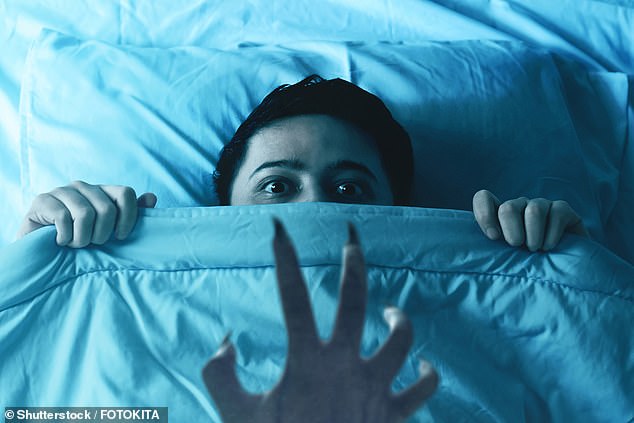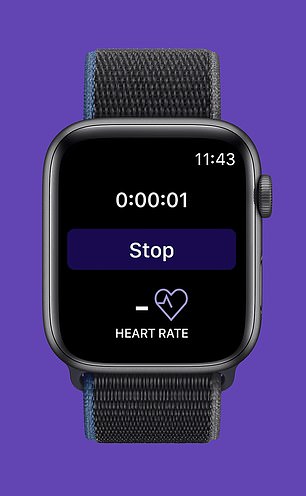Have you been chased by a monster, lost all your teeth or turned up to an event naked only to wake in a panic and realise it was all a dream?
Chances are you’ve had at least one of these common nightmares. And now researchers are uncovering the significance of nightmares, what they can indicate about our health and how they can be reduced.
While most of us experience nightmares occasionally, the American Academy of Sleep Medicine estimates around 4 per cent of adults (the equivalent of roughly two million adults in the UK) are thought to have nightmare disorder.
This is a sleep disorder characterised by frequent and vivid nightmares that cause anxiety and sleep disruption, with sufferers even trying to avoid dozing off – significantly impacting their quality of life.
Dr Abidemi Otaiku, a neuroscientist at Imperial College London, says: ‘Our view of nightmares has evolved a lot in the past few decades. Twenty or so years ago, they were seen as just a symptom of other problems such as PTSD [Post-traumatic stress disorder] or anxiety. Now someone can be diagnosed with nightmare disorder.’
Significantly, research now suggests that nightmares can be a sign of an underlying health condition. A study by the European Academy of Neurology Congress in June found that frequent nightmares are the strongest predictor of premature death (before age 70) compared with other risk factors such as obesity, poor diet and smoking.
Adults who had weekly nightmares were three times more likely to die prematurely, compared to those who said they never or rarely (less than once a month) had nightmares.
Yet despite this greater understanding, patients and doctors alike may not appreciate the significance of nightmares, adds Dr Justin Havens, a psychological therapist and expert in nightmares based in Cheltenham. ‘No one goes to the GP about nightmares because everyone thinks nothing can be done,’ he says.

The American Academy of Sleep Medicine estimates around 4 per cent of adults (the equivalent of roughly two million adults in the UK) are thought to have nightmare disorder (picture posed by model)
However, recent research suggests that a little-known therapy, known as imagery rehearsal therapy (IRT) – which involves imagining a different, happy ending for your nightmare – can help.
So why do we have nightmares? Essentially, it’s because the dream process has gone awry.
Normal dreams are thought to help with emotional regulation and processing. Studies have shown that an area in the brain, the right frontal lobe, which is involved in controlling our emotions while we’re awake, is also linked with our emotions during dreams, says Dr Otaiku.
‘One idea is that we have nightmares because our frontal lobes are less active while we sleep – meaning we’re unable to do the same emotional regulation.’
Also, all dreams occur during the rapid eye movement, or REM, stage of sleep – which is close to waking, so as a result of this process ‘we can be thrown out of sleep when nightmare content is heavy – it’s like the system blowing a fuse’, adds Dr Havens.
And he says certain nightmare scenarios such as being chased or having your teeth falling out are surprisingly common: ‘One theory is that these themes link to Stone Age man, because all of those things were existential risks back then and they almost reflect our archetypal fears of life.’
Research suggests certain genes can make us more prone to nightmares and certain personality traits have also been found to increase the risk, such as being neurotic or worrying a lot.
‘More research is needed to fully understand the connection, but one theory is that a worry-thinking style fuels anxiety, and this anxiety can increase the chances of having a nightmare by affecting the quality or structure of the sleep we get,’ explains Bryony Sheaves, an honorary consultant clinical psychologist at Oxford Health NHS Foundation Trust.
Diet may also play a part, according to research by scientists in Canada who asked 1,082 students about the quality of their sleep, eating habits and their dreams and nightmares.
The researchers reported that dairy foods often influenced people’s dreams and they believe this may be due to lactose intolerance (the inability to fully digest the sugar in milk) – possibly because experiencing gas or stomach pain while sleeping could disturb sleep and, in turn, affect dreams.
The same link applied to other food intolerances and allergies, researchers explained in the journal Frontiers in Psychology last month, adding that dietary interventions could therefore reduce nightmare frequency.
Understanding the causes of nightmares is important because of their impact on health.

Dr Justin Havens, a psychological therapist and expert in nightmares based in Cheltenham
At a simple level, they can disrupt sleep – and poor or broken sleep is known to be a significant risk factor for cardiovascular problems, type 2 diabetes, high blood pressure and obesity, as well as cognitive decline and a weakened immune system.
The research identifying frequent nightmares as a predictor of premature death can be explained in two ways, suggests Dr Otaiku, who led the study.
‘Firstly that trauma and stress might cause nightmares so they could be a reflection of poor physical and mental health. And secondly, nightmares might cause a stress response, and cortisol [the hormone released in response to stress] can cause our cells to age, and leads to higher levels of inflammation in our bodies.’
Frequent nightmares are also linked to the onset of dementia and Parkinson’s.
‘We know that typical symptoms, such as shaking in Parkinson’s and memory problems in dementia, tend to develop at a later stage – but nightmares can be an early sign,’ explains Dr Otaiku.
It’s thought that nightmares may also contribute to these conditions developing.
When we sleep, toxic proteins are cleared from the brain, explains Dr Otaiku.
‘It’s plausible that disrupted sleep could impact this process, so if you have frequent nightmares that could build up to a substantial impact.’
An increase in nightmares may be an early sign of autoimmune conditions (where the immune system attacks the body) such as rheumatoid arthritis, according to a study by the University of Cambridge and King’s College London.
The researchers found that many people with autoimmune rheumatic diseases reported vivid and distressing nightmares as one of the earliest signs.
‘It’s important to know which symptoms commonly come before a flare-up,’ says Dr Melanie Sloan, a senior research associate at the University of Cambridge, who led the study.
‘This could potentially help with earlier diagnosis and treatment to reduce the flare-up.’
It’s thought nightmares can be a sign of autoimmune conditions because any inflammation or infection in the body ‘can make sleep less stable’, adds Professor Guy Leschziner, a consultant neurologist at Guy’s and St Thomas’ NHS Foundation Trust in London, who was also involved in the study.
While simple steps including good sleep practices (going to bed and waking at the same time, reducing caffeine intake and the use of electronics before bed) as well as minimising stress can reduce nightmare occurrence, these measures won’t help people with nightmare disorder.
Here, the best option is ‘imagery rehearsal therapy’, says Dr Otaiku. IRT is available in NHS sleep clinics and a review of 69 studies found ‘strong evidence for exposure and IRT for the reduction of nightmare frequency, severity and distress’, reported the journal BMC Psychiatry in 2023.
‘It teaches people a technique that helps them feel that their nightmares are not inevitable and that they can control them,’ says Dr Otaiku.
‘That knowledge alone can make people less anxious before sleep, which would continue into sleep, and could prevent their brains from creating anxiety-laden nightmares.’
Dr Havens adds: ‘People who’ve had nightmares for several decades can find they go away within a week or even a night of using this technique.’
Could a high-tech watch help?

The NightWare watch has sensors that track heart rate and movement during sleep
New ‘dream engineering’ technologies being trialled to treat nightmares include a headband that plays gentle sounds during sleep.
A study involving 36 patients with nightmare disorder, published in 2022 in Current Biology, found that after using the headband for two weeks their nightmare frequency dropped from an average of 2.9 a week to 0.19, which was less than the control group who only received imagery rehearsal therapy.
Another approach is NightWare, a watch that has sensors that track heart rate and movement during sleep. When these are abnormal and thought to indicate a nightmare, the watch vibrates. It’s thought these vibrations are strong enough to force the wearer out of the nightmares but weak enough to prevent them waking up. A 2022 study (funded by the maker) in the Journal of Clinical Sleep Medicine found the device improved sleep quality compared with a placebo watch.
‘These new technologies probably won’t replace the existing treatments, but may one day be used alongside current treatments to make them even more effective,’ explains Dr Abidemi Otaiku, a neuroscientist at Imperial College London.












